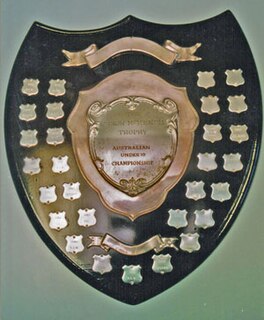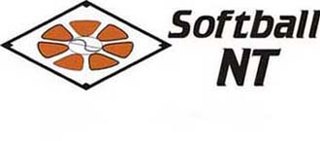
Australia's softball history began in 1939 when Gordon Young, Director of Physical Education in NSW, began to promote the game in schools and colleges. In 1942, during World War II, US army sergeant William Duvernet organised softball as a recreation for US nurses stationed in Victoria. Another American, Mack Gilley, introduced the game to Queensland in 1946. Australia's first inter-state championship was played in Brisbane in 1947 and was won by Victoria. The second national championship was held in Melbourne two years later. It was at this championship that the Australian Softball Federation was formed with Queensland, Victoria, South Australia and New South Wales being the founding members. The other States of Australia have since joined. Eight Australian Championships are now conducted each year – Women's, Men's, Under 23 Women and Men, Under 19 Women and Men, and Under 16 Girls and Boys. Softball has been a major sport in the schools program for some time now and it is estimated that more than 250,000 children play the game each year.
The Nox Bailey Shield is a trophy awarded yearly to the Under 19 Men's Champion team of the Australian Softball Federation. It is named after a famous Australian softball organiser.

Each year Softball Australia holds eight National Championships. These are hosted by the various state bodies around Australia on a rotational roster.

The Elinor McKenzie Shield is a trophy symbolizing the Under 19 Women's Championship of Softball Australia.

The Northern Territory Softball Association is the smallest state body in the Australian Softball Federation with only two affiliated Associations.

Netball is the most popular women's team participation sport in Australia. In 1985, there were 347,000 players. In 1995, there were over 360,000 Australian netball players. Throughout most of Australia's netball history, the game has largely been a participation sport; it has not managed to become a large spectator sport. In 2005 and 2006, 56,100 Australians attended one to two netball matches. Of these, 41,600 were women. 46,200 attended three to five netball matches, with 34,400 of those spectators being women. 86,400 attended six or more netball matches, with 54,800 spectators being female. Overall, 188,800 people attended netball matches, with 130,800 being female. In 2005 and 2006, netball was the 10th most popular spectator sport for women with Australian rules football (1,011,300), horse racing (912,200), rugby league (542,600), motor sports (462,100), rugby union (232,400), football (212,200), harness racing (190,500), cricket (183,200) and tennis (163,500) all being more popular. The country set an attendance record for a netball match with a record crowd of 14,339 at the Australia–New Zealand Netball Test held at the Sydney Super Dome game in 2004.
The Queensland Softball Association, now known as Softball Queensland, organises and develops the sport of softball in Queensland, Australia. Founded in 1946 as a women's association, it runs an annual state championship and state league, and attends all ASF National Championships.

Gawler Eagles FC provides organised soccer games for boys and girls, men and women from 5 years to over 50 years old, and is affiliated with Football South Australia.

Viking Park is an 7,000 capacity multi-sport stadium located in the Tuggeranong Valley suburb Wanniassa, Canberra, Australia. It has a rectangular playing surface which is used primarily to host rugby union matches but additionally has hosted rugby league, Association football and baseball. It is home to the Tuggeranong Vikings and all matches of the ACTRU Premier Division finals, the Canberra Vikings who compete in the National Rugby Championship and the Tuggeranong Vikings Baseball Club. Viking Park is also regularly utilised by ACT-based Super Rugby club The Brumbies, who use the venue for training and who used to play home matches in the Australian Provincial Championship there.

The National Premier Leagues Capital Football 1 is an soccer competition contested by clubs affiliated to Capital Football. The league is the highest level competition in the Australian Capital Territory (ACT) region. It is a subdivision of the National Premier Leagues and sits in Level 2 in the overall Australian league system.

The Tuggeranong Valley Football Club is a semi-professional, community based Australian rules football club based in Tuggeranong, Australian Capital Territory. They competed in the North East Australian Football League from 2011–13 and as of 2014 are a member club of the AFL Canberra First Grade competition.

Tuggeranong United FC are an association football club based in the southern Canberra region of Tuggeranong, ACT, Australia. The club competes in the highest level of football in the ACT, NPL Capital Football.
Softball is played in the Australian Capital Territory. The game was influenced early in its history in the territory by Queanbeyan. There are efforts to increase participation in the sport in the ACT. The territory has won the Gilleys Shield three times in a row. Players from Canberra have been on the national team, held Australian Institute of Sport scholarships and played for American universities.
The 2013 Capital Football season was the first season under the new competition format in the Australian Capital Territory. The competition consisted of two divisions across the ACT, created from the teams in the previous structure. The overall premier for the new structure qualified for the National Premier Leagues finals series, competing with the other state federation champions in a final knockout tournament to decide the National Premier Leagues Champion for 2013.
The 2017 Capital Football season was the fifth season under the new competition format in the Australian Capital Territory. The overall premier for the new structure qualified for the National Premier Leagues finals series, competing with the other state federation champions in a final knockout tournament to decide the National Premier Leagues Champion for 2017.
The 2018 Capital Football season was the sixth season under the new competition format in the Australian Capital Territory. The league premier for the new structure qualifies for the National Premier Leagues finals series, competing with the other state federation premiers in a final knockout tournament to decide the National Premier Leagues Champion for 2018.









